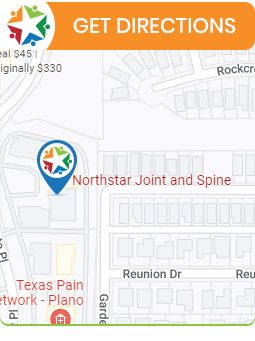When Should I Refer to a Pain Specialist?
A pain specialist can help identify the cause and provide targeted solutions for better pain management. If your pain continues despite basic treatments or is interfering with your normal activities, it may be time to refer you to a pain specialist. Board Certified Dr. Robert J. Nocerini, MD at Northstar Joint and Spine offers advanced evaluation and treatment for chronic or severe pain that doesn’t improve with standard care. For more information, contact us today or schedule an appointment. We are conveniently located at 7704 San Jacinto Pl Suite #200 Plano, TX 75024.




Table of Contents:
When should I refer to a pain specialist?
What conditions qualify for pain management?
What are the different types of pain?
What happens at the first pain management appointment?
Comprehensive Pain Evaluation by Dr. Robert J. Nocerini, MD
You may think it is best if you just deal with the pain yourself at home with at-home remedies, but often, it is best if you see a pain specialist, as they can provide a better treatment plan and solution to your pain than what you can find with over-the-counter medication help and stretching.
A few signs as to when you should see a pain specialist for your pain are:
• Pain is persistent and has lasted three months or longer
• Primary care doctor, orthopedist, or surgeon has run out of options and treatment plans that are not working
• No one has identified your source of pain thus far
• The pain stops you from being a part of certain activities
• Pain affects your mood and mental well-being negatively
• Unrelenting joint pain, nerve pain, neck pain, or back pain
You may have been told previously there is only one way or no possible way to relieve your symptoms, and if you would like more options and solutions to your pain, Northstar Joint and Spine can provide the professional knowledge that others cannot.
There are many conditions that qualify for pain management; some you may not have known could qualify. Types of pain are normally classified into one of these three main groups by pain management doctors. The first is pain caused by direct tissue damage, like arthritis. The second type is often due to nerve damage or a nervous system condition, like a stroke. The third and final type of pain that can be treated by a pain management doctor is a combination of tissue and nerve damage, like back pain.
Other conditions that can be treated by a pain management specialist include:
• Osteoarthritis
• Rheumatoid arthritis
• Stroke
• Multiple sclerosis
• Neuropathy
• Neck pain
• Back pain
• Cancer
Almost everyone has experienced pain at some point in their life, despite it being one of the most common symptoms dealt with, many do not seek medical attention for it, and the pain often goes misunderstood and inefficiently treated.
There are several different types of pain that an individual can experience, they are grouped into different categories which are:
Acute pain – sudden and lasts for a short period of time.
• Broken bone
• Fall
• Burn
• Cut
• Dental work
• Labor or childbirth
• Surgery
Chronic pain – persistent pain that often lasts longer than six months.
• Arthritis
• Back pain
• Cancer
• Circulation issues
• Diabetes
• Fibromyalgia
• Headache
Breakthrough pain – sudden, short, and often sharp pain that increases over time, and often occurs in individuals who are already taking medications to relieve chronic pain caused by conditions like arthritis, fibromyalgia, and cancer.
Bone pain – tender, aching, or uncomfortable in one or more bones.
Nerve pain – nerve damage pain or due to inflammation, felt often as sharp, shooting, burning, or stabbing pain.
• Alcoholism
• Cancer
• Circulation issues
• Diabetes
• Shingles
• Limb amputation
• Multiple sclerosis
• Stroke
• Vitamin B12 deficiency
Phantom pain – Pain that feels like it is coming from an area on the body that is no longer there.
Soft tissue pain – Pain that often results from damage or inflammation to the muscles, tissues, or ligaments.
• Back pain
• Neck pain
• Bursitis
• Fibromyalgia
• Rotator cuff
• Sciatic pain
• Temporomandibular joint syndrome
Referred pain – often feels like it is coming from one particular location, but it is actually due to an inflammation from another structure or organ.
During your consultation appointment with a pain management specialist, expect to go over the following:
• Reasons why you are visiting them in the first place
• Treatment plans from your primary physician or other medical providers
• Previous procedures
• Previous surgeries
• Current medical issues
• X-rays, lab results, or other diagnostic imaging tests
• List of current medications and prescriptions
A comprehensive pain evaluation with Dr. Robert J. Nocerini, MD, at Northstar Joint and Spine begins with a detailed review of your medical history, current symptoms, and previous treatments. Dr. Nocerini takes a patient-centered approach, ensuring every aspect of your pain experience is carefully understood—whether it’s chronic, or post-surgical. His assessment often includes physical examinations, diagnostic imaging, and advanced tests to pinpoint the exact source of discomfort rather than just addressing the symptoms. This method allows him to develop a clear understanding of how pain affects your mobility, function, and overall quality of life.
Personalized Treatment Plans for Lasting Relief
Dr. Nocerini’s evaluation process is designed to create a personalized care plan that restores comfort and enhances daily performance. As a board-certified pain management specialist, he combines evidence-based medicine with innovative therapies such as targeted injections and nerve blocks to provide effective relief. Patients appreciate his compassionate communication style and dedication to achieving long-term results. At Northstar Joint and Spine, Dr. Nocerini’s goal is not only to relieve pain but also to help you regain confidence, mobility, and independence in your everyday life.
For more information, contact us today or schedule an appointment. We are conveniently located at 7704 San Jacinto Pl Suite #200 Plano, TX 75024. We serve patients from Plano TX, Willow Bend TX, Frisco TX, Allen TX, Addison TX, North Dallas TX, and surrounding areas.

Check Out Our 5 Star Reviews


Additional Services You May Need
▸ Back Pain
▸ Shoulder Pain
▸ Chronic Pain
▸ Epidural Steroid Injections
▸ Spinal Cord Stimulation
▸ Viscosupplementation
▸ Genicular Nerve Blocks
▸ Facet Injections
▸ Joint Injections
▸ Sacroiliac Joint Injections
▸ Lumbar and Cervical
▸ Facet Medial Branch Blocks
▸ Diagnostic Nerve Blocks
▸ Medication Management
▸ Neck Pain Doctor
▸ Diabetic Peripheral Neuropathy
▸ Headaches
▸ Suboxone
▸ Peripheral Nerve Stimulation
▸ Spine
▸ Joints
▸ Muscles
▸ Bones

Additional Services You May Need
▸ Back Pain
▸ Shoulder Pain
▸ Chronic Pain
▸ Epidural Steroid Injections
▸ Spinal Cord Stimulation
▸ Viscosupplementation
▸ Genicular Nerve Blocks
▸ Facet Injections
▸ Joint Injections
▸ Sacroiliac Joint Injections
▸ Lumbar and Cervical
▸ Facet Medial Branch Blocks
▸ Diagnostic Nerve Blocks
▸ Medication Management
▸ Neck Pain Doctor
▸ Diabetic Peripheral Neuropathy
▸ Headaches
▸ Suboxone
▸ Peripheral Nerve Stimulation
▸ Spine
▸ Joints
▸ Muscles
▸ Bones






